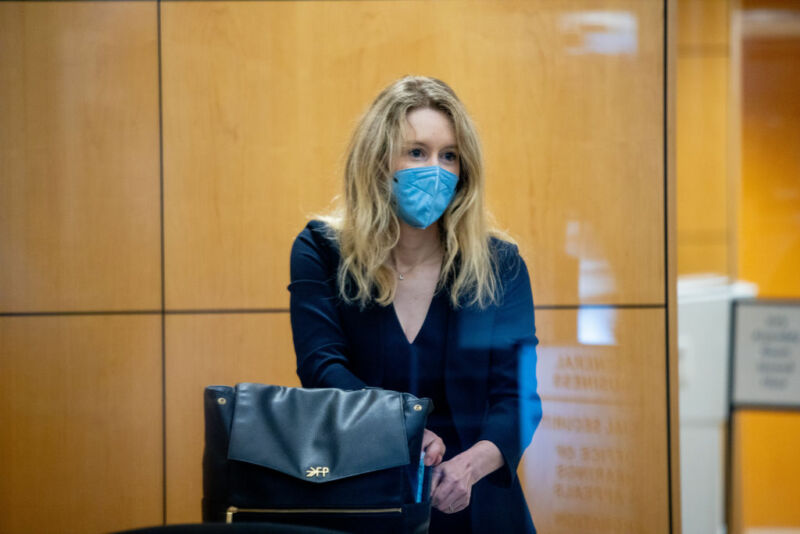Did All Those Investors Of Theranos Really Lose Their Money?
Theranos trial —
Theranos burned through $2M a week equally investors were given rosy projections
Jurors heard about mounting losses, fudged data from first witnesses.

Enlarge / Theranos founder Elizabeth Holmes collects her belongings after going through security at the Robert F. Peckham Federal Edifice with her defence force team on Baronial 31, 2021, in San Jose, California.
Ethan Swope | Getty Images
Effectually the fourth dimension that Theranos was losing nearly $2 meg per calendar week, investors in the blood-testing startup were being told that the company would before long exist bringing in almost $1 billion per yr.
It'south not uncommon for startups to lose money in their early years, and it's not entirely unusual for the fastest burn down rate to happen right before things turn around. Instead, Theranos continued to produce mounting losses. Merely that's non what the company was telling investors, according to new documents shared during the jury trial of Theranos founder and CEO Elizabeth Holmes.
In court yesterday, jurors heard testimony from the visitor's longtime chief financial officer, Danise Yam, who also goes past And then Han Spivey. Yam said that Theranos lost $sixteen.2 million in 2010, $27.2 million in 2011, $57 million in 2012, and $92 1000000 in 2013. In 2013, things had "started to get a chip tight," Yam said. There were weeks where the visitor was burning through around $2 million per calendar week, and there wasn't any revenue to help improve the losses. In 2012 and 2013, Yam didn't even carp adding a line for acquirement—there was none.
Afterward asking questions about Theranos' continued losses and lack of revenue, prosecutors showed Yam a document they said was shared with investors; information technology projected $140 million in revenue in 2014 and $990 million in 2015. Yam said she had never seen the certificate before, nor did she know where those numbers had come from.
"Did you ever provide fiscal projections to investors?" Robert Leach, an assistant U.s. attorney, asked Yam.
"No," she said.
In fact, Yam relied heavily on Holmes for financial projections. When Yam was working with an analytics firm to cost stock options, she asked Holmes for some key financial forecasts, including projected acquirement, considering the CEO had "the best information." During that process, Yam had emailed Holmes request her how much revenue she was anticipating. In a reply, Holmes said she was projecting $100 1000000 for 2015, virtually ten times less than what she told investors at ane point.
Despite persistent losses, Holmes' salary increased from $200,000 to $400,000, Yam said.
Quality problems
The adjacent witness was Erika Cheung, who was hired by Theranos out of undergrad as a lab associate. Cheung said she joined the company largely on the star power of its CEO. "She had a charisma to her; she was very articulate," Cheung said of Holmes. "She had a strong sense of conviction to her mission."
Cheung quit later seven months on the job and filed a whistleblower complaint with the Centers for Medicare and Medicaid Services, alleging that the company used expired lab supplies for tests run on its proprietary "Edison" testing devices, which themselves had "major stability, precision, and accuracy problems."
She first grew concerned nearly Theranos' proprietary machines when she used them to test her own blood. "Employees would essentially donate their blood to Theranos for greenbacks," Cheung said. When checking Edison'due south performance on a vitamin D exam, "it would always come upwardly that I was deficient," she added. Yet, when she ran a test on another company'south device, which Theranos kept in case its ain machine wasn't upward to the task, her vitamin D levels appeared normal.
"I was uncomfortable processing patient samples," she said. "I did not recollect the technology we were using was acceptable enough to be engaging in that behavior."
While working at Theranos, Cheung sent an email to others in the company, sharing her concerns about the Edison machines. Those emails somewhen made their way to Holmes, who asked, "How fast tin can we resolve this issue?" Some other employee replied that, after omitting some data, the problem appeared solved.
Most of the tests that Theranos was performing for clients were done on devices made by other companies, Cheung testified. Just 12 tests were performed on Edison devices, and "the Edison analyzer could but run one blazon of examination for one patient at a given time," she said.
Government inspectors who arrived at Theranos in response to Cheung'south letter constitute conditions similar to those in the complaint. They proposed revoking the company'southward license to test human specimens. Theranos eventually settled that matter with the government, voluntarily endmost all of its labs.
After Cheung went to the federal regime, Theranos hired a private detective to spy on her, according to courtroom documents released concluding calendar week. The company spent over $150,000 surveilling her and another whistleblower. Cheung'due south testimony continues today.
Source: https://arstechnica.com/tech-policy/2021/09/theranos-promised-investors-1b-in-revenue-despite-internal-projection-of-just-100m/
Posted by: cannonsucan1942.blogspot.com

0 Response to "Did All Those Investors Of Theranos Really Lose Their Money?"
Post a Comment